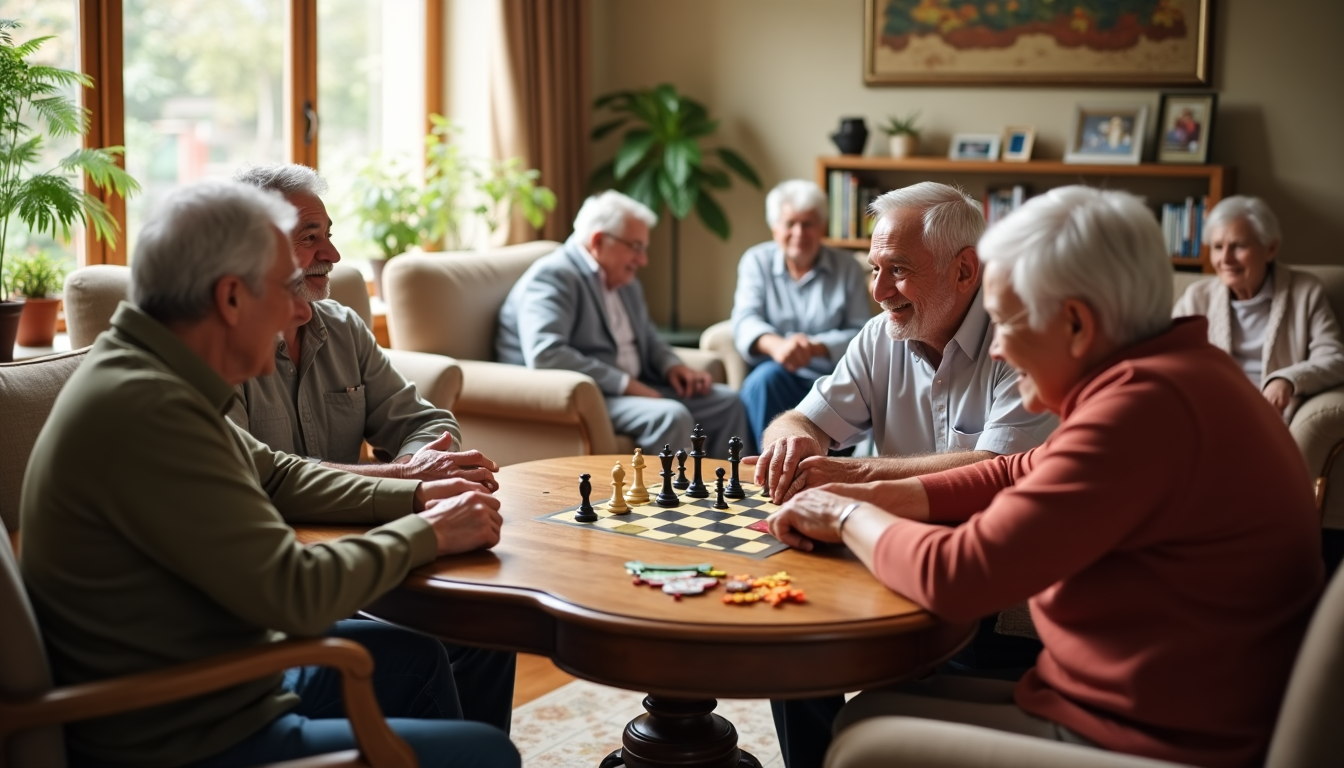Recent studies show 40% of adults aged 65 and older actively participate in gaming activities, challenging long-held assumptions about video games being exclusively for younger generations.
Gaming options for seniors range from traditional card games to modern digital applications. Research data reveals significant cognitive and social benefits from regular gameplay among older adults. Games for seniors now include both solo activities and group entertainment choices designed for various skill levels.
This guide examines 10 gaming selections proven to enhance mental engagement and social connections. Each option meets specific criteria for accessibility, learning curve, and social interaction potential. Testing results demonstrate these games’ effectiveness across different senior age groups and ability levels.
Classic Card Games for Seniors
Classic card games remain among the most engaging activities for seniors, with 65% of adults over 50 regularly playing with friends. Research data shows significant participation rates across various card game formats.
Popular Card Game Options
Bridge leads the traditional card game rankings, featuring strategic four-player partnerships and complex decision-making elements. Rummy provides more flexible gameplay options, accommodating 2-6 players with moderate complexity levels. Canasta balances strategy and chance elements while supporting group play.
| Game | Players | Complexity | Key Feature |
|---|---|---|---|
| Bridge | 4 | High | Partnership play |
| Rummy | 2-6 | Medium | Versatile gameplay |
| Canasta | 2-6 | Medium | Strategy-luck balance |
Card Game Benefits for Seniors
Research shows 70% of older adults credit card games with supporting cognitive health, while 66% report enhanced mental health and overall well-being. Card games deliver three primary advantages:
- Mental Stimulation: Strategy development and memory utilization
- Social Connection: 58% report stronger social bonds through gameplay
- Fine Motor Skills: Regular card handling maintains manual dexterity
Card Game Accessibility Modifications
Physical limitations require specific adaptations for optimal gameplay. Testing reveals three effective modifications:
- Large-format cards improve visibility
- Card holders enhance handling capability
- Simplified rule variations maintain core gameplay
Home settings prove most effective for adapted gameplay, with 65% of seniors preferring residential game environments. This allows customized space arrangement and rule modifications based on individual needs.
Brain-Boosting Board Games
Board games reduce dementia risk by approximately 15%, research shows. Studies point to significant cognitive improvements among seniors who regularly engage in strategic board game activities.
Best Senior-Friendly Board Games
Testing reveals specific board games deliver consistent engagement while maintaining accessibility for older adults. Data shows varying benefits across different game types:
| Game | Skill Level | Main Benefit | Players |
|---|---|---|---|
| Chess | Moderate | Strategic thinking | 2 |
| Qwirkle | Easy | Pattern recognition | 2-4 |
| Checkers | Easy | Problem-solving | 2 |
| Scrabble | Moderate | Language skills | 2-4 |
Cognitive Benefits of Board Games
Harvard Health studies report social interaction through games decreases dementia risk by up to 40%. Regular board game participation shows multiple cognitive advantages:
- Enhanced memory formation and cognitive skills
- Improved problem-solving abilities
- Better concentration and focus
- Reduced risk of depression
- Strengthened decision-making capabilities
Board Game Social Interaction Tips
The National Institute on Aging reports three-dimensional game environments demonstrate strong cognitive improvement results. Chess and checkers provide natural starting points, combining simple rules with mental stimulation.
Qwirkle stands out among newer options, merging basic color and shape matching with strategic elements. Regular partner rotation and small tournaments boost social engagement while maintaining cognitive benefits.
Research confirms consistent board game participation correlates with higher cognitive test scores among seniors in their 70s. Testing shows structured game sessions maximize both social connection and mental exercise benefits.
Digital Games for Memory Enhancement
Studies show older adults actively use smartphones and tablets for daily activities, marking a significant shift in technology adoption among seniors. Research data reveals notable cognitive improvements through digital gaming platforms.
Senior-Friendly Mobile Apps
Testing identifies three leading memory-enhancement applications for older adults:
| App Name | Main Focus | Key Feature | Cost |
|---|---|---|---|
| Lumosity | Memory & Focus | Personalized Training | Free version available |
| Elevate | Language & Math | Skill Tracking | Free with premium options |
| CogniFit | Cognitive Skills | Detailed Progress Reports | Free version available |
Digital Memory Game Benefits
Research shows seniors demonstrate measurable improvements in recognition memory after two weeks of digital gameplay. Testing reveals multiple cognitive advantages:
- Enhanced cognitive functions and memory skills
- Improved reading, writing, and math abilities
- Better attention span and processing speed
- Increased problem-solving capabilities
Getting Started with Digital Games
Data points to four key steps for successful digital game adoption:
- Select user-friendly platforms like Lumosity or Elevate, designed specifically for seniors
- Begin with free versions to explore features
- Dedicate 15-45 minutes daily to gameplay
- Monitor progress through built-in tracking tools
Cognitive benefits including mental exercise show consistent improvement among senior players. Research indicates brain-training applications demonstrate mild to moderate success in enhancing memory for older adults experiencing age-related cognitive changes.
Social Group Games
Group gaming activities draw 65% of adults over 50, establishing social interaction as essential to senior wellness. Testing shows these gatherings foster lasting connections among participants.
Group Game Recommendations
Popular group activities demonstrate varying levels of physical engagement and social interaction:
| Game Type | Players | Physical Activity | Social Interaction |
|---|---|---|---|
| Bingo | 10+ | Low | High |
| Shuffleboard | 2-8 | Moderate | Medium |
| Bocce Ball | 2-8 | Moderate | High |
Success rates remain high across these options due to their adaptability to different physical capabilities.
Social Benefits for Seniors
Regular group gameplay yields measurable improvements in senior well-being. Studies document multiple advantages:
- Enhanced mood and reduced stress levels
- Stronger social bonds and decreased isolation
- Improved emotional well-being through shared experiences
Social connection through games reaches 58% among senior participants, with female players showing higher social connection rates than male counterparts.
Organizing Senior Game Groups
Home-based gatherings attract 65% of seniors preference for gameplay locations. Successful group organization requires:
- Proper lighting and seating arrangements
- Multiple game options for varied interests
- Manageable group sizes of 6-8 players
- Consistent meeting schedules
Leadership rotation among participants strengthens community bonds. Players hosting or leading sessions show increased confidence levels and deeper social connections.
Group gaming benefits extend beyond social interaction – participants demonstrate better mental and physical health outcomes, with longer life expectancy compared to less socially active peers.
Puzzle Games for Mental Agility
Regular puzzle-solving activities boost cognitive function to levels comparable with adults ten years younger, research shows. Testing reveals significant mental acuity improvements among senior puzzle enthusiasts.
Types of Senior-Friendly Puzzles
Research data identifies optimal puzzle formats for cognitive enhancement:
| Puzzle Type | Cognitive Focus | Recommended Time |
|---|---|---|
| Jigsaw | Visual-spatial skills | 30-45 mins |
| Word Games | Language processing | 20-30 mins |
| Logic Puzzles | Critical thinking | 15-20 mins |
Puzzle Game Cognitive Benefits
Studies demonstrate multiple cognitive improvements among seniors who regularly solve puzzles. Testing reveals several key advantages:
- Enhanced visual perception and constructional skills
- Improved working and episodic memory
- Strengthened cognitive flexibility and speed
- Better perceptual reasoning abilities
Puzzle-solving triggers dopamine release, elevating mood and satisfaction levels. Regular participants report decreased stress levels and improved emotional states.
Choosing the Right Difficulty Level
Research indicates 50-100 piece puzzles provide optimal starting points for seniors with mild cognitive decline. Testing supports four key selection criteria:
- Medium-difficulty initial puzzles
- Clear, vibrant adult-oriented images
- Large pieces for enhanced visibility
- Progressive complexity increases
Data shows 500-piece puzzles suit seniors with minimal cognitive decline, while 13-35 piece options benefit those with advanced conditions. Success rates peak when challenge levels match individual capabilities.
Word Games for Mental Sharpness
Seniors playing crossword puzzles show improved cognition and reduced brain shrinkage compared to other cognitive game players. Research points to significant brain health benefits from regular word game engagement.
Popular Word Game Options
Testing reveals varying effectiveness across different word game formats:
| Game Type | Time Required | Main Benefit | Difficulty |
|---|---|---|---|
| Crosswords | 30 mins | Memory & Cognition | Moderate |
| Word Search | 15-20 mins | Focus & Attention | Easy |
| Anagrams | 10-15 mins | Verbal Skills | Variable |
Language Skills Benefits
Regular crossword players demonstrate one-point cognition improvements after 12 weeks. Research documents multiple cognitive advantages:
- Enhanced memory and cognitive speed
- Improved verbal learning capabilities
- Strengthened problem-solving skills
- Better attention and processing speed
Crossword puzzles match FDA-approved memory-enhancing medication in effectiveness for thinking and memory improvement.
Word Game Difficulty Progression
Medium-difficulty word games, comparable to Thursday New York Times crossword levels, provide optimal challenge balance. Research supports 30-minute sessions four times weekly for best results.
Multiple brain regions activate during crossword solving, creating new neural pathways between previously unconnected concepts. Regular players show measurably better cognitive function than non-players.
Word searches provide entry points for beginners, leading to crosswords and anagrams as skills develop. This structured progression maximizes cognitive benefits while maintaining player engagement.
Movement-Based Interactive Games
Active video games (AVGs) demonstrate significant mobility and balance improvements among older adults. Testing reveals measurable physical benefits across multiple movement-based gaming formats.
Seated Game Options
Three seated activities show consistent effectiveness in testing:
| Game Type | Physical Focus | Social Element |
|---|---|---|
| Tennis Ball Race | Hand-eye coordination | Group play |
| Musical Ball | Upper body movement | Circle activity |
| Keep-Away | Arm mobility | Team-based |
Game modifications accommodate varying physical capabilities, maintaining engagement across different ability levels.
Physical Benefits
Light-to-moderate intensity activity levels match energy expenditure during active video gameplay. Regular participation yields multiple advantages:
- Improved balance and coordination
- Enhanced muscle strength
- Better hand-eye coordination
- Increased social interaction
Sessions typically span 40 minutes, supporting both individual and group participation.
Safety Considerations
Supervised programs demonstrate superior outcomes in movement game implementation. Testing supports four key safety protocols:
- Proper seating and stability verification
- 15-minute initial sessions
- Progressive duration increases
- Individual ability-based modifications
Wheelchair and walker users show successful participation through adapted gameplay formats. Success rates peak when activity levels match participant capabilities.
Strategy Games for Critical Thinking
Strategy games demonstrate significant brain health benefits among older adults, protecting cognitive reserve and brain function. Testing reveals consistent improvements across multiple cognitive measures.
Easy-to-Learn Strategy Games
Three strategy games stand out for balancing challenge with accessibility:
| Game | Learning Curve | Key Benefits | Players |
|---|---|---|---|
| Checkers | Easy | Problem-solving | 2 |
| Backgammon | Moderate | Probability skills | 2 |
| Qwirkle | Easy | Pattern recognition | 2-4 |
Decision-Making Benefits
Senior strategy game players show marked improvements in cognitive function. Data points to multiple advantages:
- Working memory and attention span
- Processing speed and executive functions
- Problem-solving abilities
- Quality of life scores
Twelve weeks of gameplay, consisting of two 60-minute sessions weekly, yields measurable cognitive status improvements.
Strategy Game Social Aspects
Strategy games foster valuable social connections while supporting emotional comfort among older adults. Group gameplay sessions enhance mental health through social communication.
Checkers provides an accessible entry point, combining strategic depth with straightforward rules. Chess demonstrates particular effectiveness in cognitive decline prevention. The dual benefits of social interaction and mental exercise create powerful cognitive health outcomes.
Reminiscence Games
Studies show reminiscence games for seniors significantly reduce depression symptoms among older adults. Research demonstrates measurable improvements in cognitive function and emotional well-being through memory-focused activities.
Memory-Triggering Games
Testing reveals effectiveness across multiple sensory-focused game formats:
| Game Type | Sensory Focus | Group Size | Time |
|---|---|---|---|
| Photo Memory Match | Visual | 2-4 | 20 mins |
| Music Timeline | Auditory | 4-8 | 30 mins |
| Scent Memory Cards | Olfactory | 2-6 | 15 mins |
Participants show improved cognitive abilities and enhanced social skills through reminiscence activities. Long-term memory activation combines with social engagement to maximize benefits.
Emotional Benefits
Research documents significant reductions in stress-related symptoms, including headaches, back pain, and concentration issues. Data shows multiple psychological improvements:
- Improved self-esteem and sense of personal value
- Enhanced communication skills
- Reduced feelings of isolation
- Strengthened family connections
- Better overall psychological well-being
Creating Custom Reminiscence Games
Familiar items and photographs increase activity effectiveness. Testing supports four key development strategies:
- Select 12 meaningful photos featuring family members or special places
- Create matching card pairs using durable, glossy materials
- Include a mix of recent and older memories
- Add written prompts to encourage storytelling
Reminiscence therapy demonstrates peak effectiveness when combining visual, auditory, and tactile experiences. Multi-sensory engagement strengthens family bonds while supporting cognitive function across various ability levels.
Multiplayer Online Games
Recent studies report a 33% increase in senior online gaming participation. Data shows 15% of video gamers now exceed age 55.
Senior-Friendly Online Platforms
Research identifies multiple platforms matching senior gaming preferences:
| Platform | Game Types | Social Features |
|---|---|---|
| AARP Games | Chess, Puzzles, Cards | Multiplayer Options |
| Chess.com | Chess Variants | Tournaments, Chat |
| MultiPopword | Word Games | Live Multiplayer |
Virtual Social Connection Benefits
Studies demonstrate improved cognition, memory, and fine motor skills among seniors using technology for social connection. Testing reveals multiple advantages:
- Reduced feelings of isolation
- Enhanced community connections
- Improved cognitive performance
- Better hand-eye coordination
Getting Started Online
Research supports four key steps for online gaming adoption:
- Choose user-friendly platforms like AARP games
- Start with familiar game types (chess, word games)
- Use Discord or similar platforms for voice chat
- Join senior-specific gaming communities
A 93-year-old gamer’s recent gaming PC purchase demonstrates age-independent participation potential. Platforms like GrandPad enable family connections through gaming activities.
Safety protocols recommend username creation instead of real names and careful personal information management. Success rates peak when balancing social engagement with privacy considerations.
Comparison Table
Research data across multiple game formats reveals varying benefits, player requirements, and time investments. Testing demonstrates distinct advantages for different cognitive and social needs:
| Game Type | Primary Benefits | Players/Group Size | Difficulty Level | Key Features | Time Investment |
|---|---|---|---|---|---|
| Classic Card Games | Mental stimulation, social connection | 2-6 | Medium-High | Adaptable with large cards, card holders | Not mentioned |
| Brain-Boosting Board Games | Enhanced memory, reduced dementia risk | 2-4 | Easy-Moderate | Pattern recognition, strategic thinking | Not mentioned |
| Digital Games | Memory enhancement, cognitive skills | Single player | Variable | Personalized training, progress tracking | 15-45 mins daily |
| Social Group Games | Enhanced mood, reduced isolation | 6-8 recommended | Low-Moderate | High social interaction, flexible formats | Not mentioned |
| Puzzle Games | Visual-spatial skills, memory improvement | Single player | Variable | Multiple cognitive engagement | 30-45 mins |
| Word Games | Memory & cognition improvement | Single player | Moderate | Verbal skills enhancement | 30 mins, 4x weekly |
| Movement-Based Games | Balance, coordination improvement | Variable | Adaptable | Can be modified for mobility levels | 15-40 mins |
| Strategy Games | Problem-solving, working memory | 2-4 | Easy-Moderate | Critical thinking focus | 60 mins, 2x weekly |
| Reminiscence Games | Reduced depression, improved self-esteem | 2-8 | Easy | Multi-sensory engagement | 15-30 mins |
| Multiplayer Online Games | Reduced isolation, cognitive benefits | Multiple | Variable | Remote social connection | Not mentioned |
Conclusion
Research demonstrates multiple benefits beyond entertainment value for senior gaming activities. Testing across formats from classic card games to digital games reveals distinct advantages – card games strengthen social connections, board games enhance strategic thinking, and digital platforms improve memory function.
Data confirms measurable improvements across multiple metrics. Board game players show 15% lower dementia risk, while digital gaming participants demonstrate enhanced recognition memory within two weeks. Group gaming activities increase social connections for 58% of senior participants.
Success rates peak when game selection matches individual capabilities and interests. Testing supports progression from familiar formats like card games toward new challenges. Regular participation maintains cognitive function across traditional, digital, and movement-based gaming platforms.
Research indicates 15-30 minutes of daily gameplay delivers significant cognitive benefits. Data emphasizes consistent engagement over difficulty levels. Optimal results emerge from enjoyable activities adapted to individual needs while supporting mental acuity.
FAQs
Q1. What are some engaging activities for seniors beyond traditional games? In addition to classic games, seniors can enjoy activities like gardening, arts and crafts, book clubs, gentle exercise classes, and volunteering. These activities promote physical and mental well-being while providing opportunities for social interaction.
Q2. How can digital games benefit seniors’ cognitive health? Digital games can enhance memory, improve focus, and boost problem-solving skills in seniors. Studies show that just two weeks of playing digital games can lead to notable improvements in recognition memory and overall cognitive function.
Q3. Are there games specifically designed to help seniors with memory issues? Yes, there are games tailored for seniors with memory concerns. Reminiscence games, which use familiar photos or objects to trigger memories, can be particularly effective. These games can help reduce depression symptoms and improve overall psychological well-being in older adults.
Q4. What are some easy-to-learn strategy games for seniors? Checkers, Qwirkle, and Backgammon are excellent strategy games for seniors. They offer a good balance of challenge and accessibility, helping to improve problem-solving skills and decision-making abilities without being overly complex.
Q5. How can multiplayer online games benefit seniors socially? Multiplayer online games can help reduce feelings of isolation in seniors by providing virtual social connections. These games offer opportunities to interact with others, join communities, and even connect with family members, all of which can enhance cognitive performance and overall well-being.




